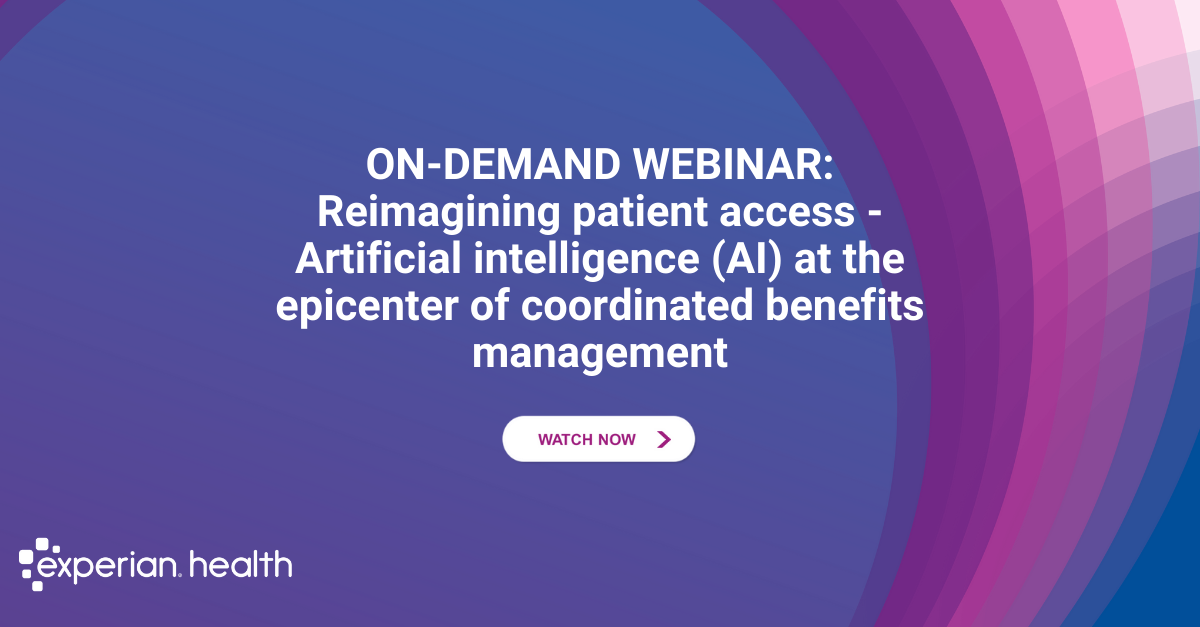At A Glance
Claim denials are increasing, putting pressure on staff and revenue. Experian Health's latest report outlines key factors driving denials today and how AI and automation can help providers strengthen claim accuracy and financial performance.
Key takeaways:
- Experian Health’s State of Claims 2025 report is out now, detailing providers’ views on claims management and how these have changed since the survey began in 2022.
- Claim denials are still on the rise, causing providers to find faster and more efficient ways to submit clean claims the first time.
- When it comes to solutions, optimism about artificial intelligence (AI) is high, but uptake remains surprisingly low.
- AI-powered tools like Patient Access Curator™ and AI Advantage™ can help healthcare providers reduce claim denials while optimizing the claims management process.
According to Experian Health’s State of Claims 2025 report, claim denials continue to negatively impact America’s healthcare providers. This quantitative survey of 250 healthcare professionals, carried out in June and July 2025, reveals providers’ concerns about rising denial rates, staffing shortages and uncertainty over whether payers or patients will ultimately pay. The findings show that providers are open to new claims processing and denial reduction solutions. However, while providers are enthusiastic about artificial intelligence’s ability to ease the squeeze, only a small fraction are actually using it.
This article highlights a few key takeaways from healthcare providers’ statements about the current challenges in claims management and the factors that contribute to their responses.
Takeaway 1: Claim denials are on the rise again
This year’s survey confirms what providers have been seeing for several years: claim denials are not letting up. In 2022, 30% reported that at least 10% of their claims were denied. By 2024, the figure had grown to 38%. Now, in 2025, 41% of providers say their claims are denied over 10% of the time. If this trend continues, how much further could denial rates climb?
Claim denials are becoming a growing part of everyday operations, demanding more time, staff and resources. Margins that are already under pressure are strained further by missed reimbursements. And when insurers don’t pay, more of the bill falls to patients, many of whom are already struggling to manage medical costs. Half of respondents said they are “very or extremely concerned” about patients’ ability to pay, up six percentage points from last year. For many organizations, the question is not whether denials will continue, but how best to prevent them before the financial burden worsens.
Takeaway 2: How bad data leads to more healthcare claim denials
The report lists several of the top triggers for denials, but inaccurate and incomplete data continue to stand out. More than half of providers (54%) say claim errors are increasing, and nearly seven in ten (68%) report that submitting clean claims is more challenging than it was a year ago.
Many of these errors originate at registration. Incomplete or inaccurate information collected during check-in is now the third most common cause of denials, with 26% of respondents saying that at least one in ten denials at their organization can be traced back to intake errors. Every mistake sends ripples downstream, leading to costly rework, avoidable payment delays and unnecessary patient stress.
Tightening up patient access processes and accurate data collection is one of the best things providers can do to curb denials. With that in mind, Experian Health’s Patient Access Curator is designed to help providers capture accurate data the first time. Using AI and machine learning, it consolidates eligibility checks, coordination of benefits, Medicare Beneficiary Identifier (MBI) verification, demographics, insurance coverage and financial status into a single workflow. This allows providers to:
- Quickly collect accurate patient information upfront
- Eliminate the need to re-run eligibility checks, which now take more than 10 minutes for over half of providers
- Reduce manual data entry errors that lead to downstream denials
- Free up staff time for higher-value tasks
Takeaway 3: An AI paradox in healthcare claims: High optimism, low adoption
Patient Access Curator is a great example of how AI can help address the data problems behind denials. But clean data alone isn’t enough. Errors and risks still emerge mid-cycle. Here, AI Advantage offers another application for AI, using predictive analytics to identify high-risk claims before submission and routing them for correction. It also triages denials based on the likelihood of reimbursement, so staff don’t lose time on unproductive rework.
69% of healthcare providers who use AI say that AI solutions have reduced denials and/or increased the success of resubmissions.
State of Claims 2025 report | Experian Health
The survey shows many providers are enthusiastic about AI’s potential: 67% believe AI can improve the claims process, and 62% are very confident in their understanding of how AI differs from automation and machine learning, up sharply from just 28% in 2024.
Despite this optimism, adoption is surprisingly low. Only 14% of providers are currently using AI to reduce denials. The survey suggests that even though the majority of AI adopters report fewer denials and more successful resubmissions, fear of the unknown seems to be slowing progress.
Takeaway 4: Tech upgrades aren’t enough without integration
Even if they remain on the fence about AI, providers are still moving to modernize claims management. Only 56% believe their current technology is sufficient to handle revenue cycle demands, a major drop from 77% in 2022. This explains why 55% are willing to completely replace their existing claims management platform if presented with a compelling return on investment.
Much of the frustration comes from fragmentation. Nearly eight in ten providers say their organizations still rely on multiple solutions to collect the information needed for a claim submission. Switching between systems slows down intake, creates duplication and increases the risk of errors that feed directly into denials.
An integrated solution like Patient Access Curator solves this problem by replacing a patchwork of tools with a single platform that manages intake and eligibility in one workflow. Information is captured in one place, reducing the duplication and errors that are inevitable when data is entered into multiple databases. Extending this with AI Advantage links front-end accuracy with back-office intelligence, giving providers a connected denial-prevention system rather than stitching together isolated fixes. With fewer tools to log into, staff can work more efficiently and focus on submitting cleaner claims.
Closing the technology gaps in claims management to prevent denials
The 2025 State of Claims report clearly shows that denials remain a persistent and costly problem for healthcare organizations. An overwhelming majority say that reducing them is a top organizational priority.
Beyond the financial concerns, the survey reveals a system still held back by data errors, fragmented technology and delays. At the same time, there are hints of cautious optimism. Last year, many providers felt in the dark about AI and machine learning. This year’s survey shows that awareness of these technologies has grown considerably, even if adoption is still early. As the report sheds light on how leaders are weighing investments in new technology, the question now is whether providers can turn growing confidence in AI into action that delivers the results they need.
To see the full picture of where claims management stands today, and where it could go next, download the State of Claims 2025 report.



